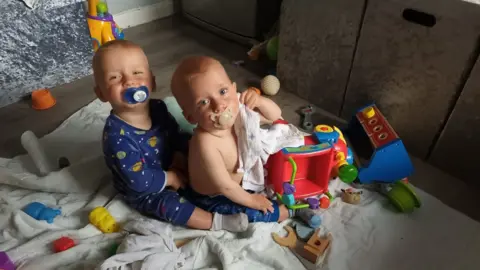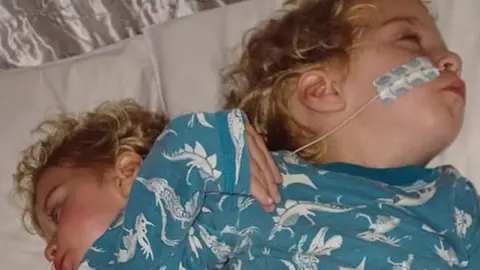Madeley mum raising awareness of twins' rare disease
 Nicola
NicolaA mum is trying to raise awareness of a rare genetic disorder her twin boys live with.
Nicola's toddlers, Lucas and Aiden, aged two and a half years old, were diagnosed with Negative Regulator of Reactive Oxygen Species (NRROS).
Those with it experience severe epilepsy and lose developmental skills.
Nicola, 35, from Madeley, Staffordshire, said they were among about 13 people in the world known to have the condition.
She said there was currently no research on the condition and no specific treatment for it.
"At the minute it's just trying to control the seizures," she told BBC Radio Stoke.
"It's not very nice to see when you watch your own kids suffering. They literally can't do anything."
The family were exploring whether medical cannabis could be used to treat the twins' epilepsy and control their seizures, Nicola added.
They have an appointment in December with doctors at the Royal Stoke University Hospital to discuss the issue.
 Nicola
NicolaLucas and Aiden first started having seizures when they were nine months old but initially only when they were unwell, their mum said.
They then started having daily seizures when they were about 18 months old.
Nicola was first warned there might be an issue when she was 32 weeks pregnant.
At the time, doctors noticed fluid sacs on the boys' brains but said it could be something or it could be nothing, she said.
They were born normal and healthy and, until the seizures, they played, sat up, talked, laughed, fed themselves and did everything a normal baby would do, Nicola added.
'Like newborns'
Now, neither can sit up by themselves and were like newborn babies.
"Everything they do, we have to do for them like full time carers," Nicola said.
A family friend has set up an online fundraising page to help with travel costs and for a treatment if it became available.
Nicola also set up a Facebook page to raise awareness and said she had already heard from a family in Texas who were also living with the condition.
"We're basically hoping more research can be done, and there'll be more research or a medicine that will give them a better chance at life," she added.
"Hopefully in time more cases will be known and then more research will be done and hopefully a cure will be found to help the boys."

Follow BBC West Midlands on Facebook, X and Instagram. Send your story ideas to: [email protected]
